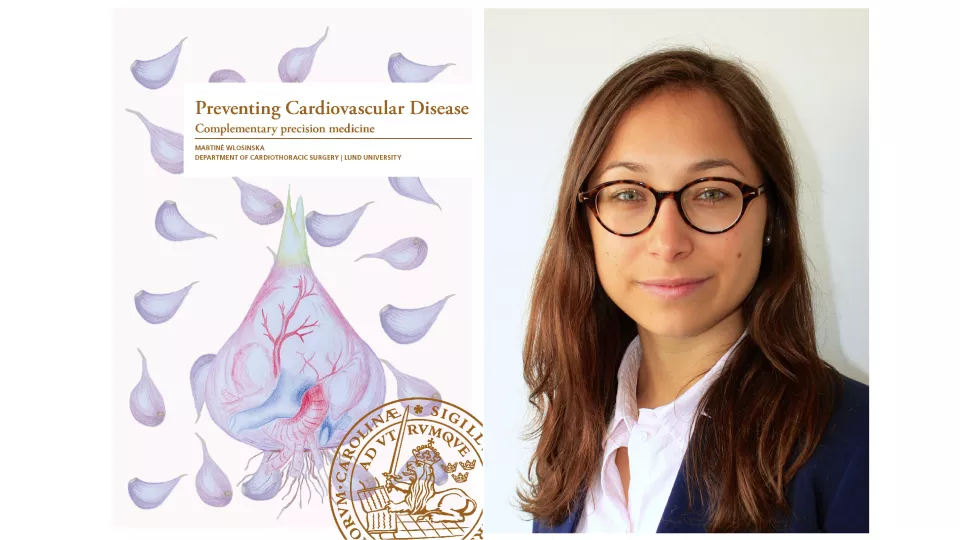Can you tell us more about your PhD research?
During my PhD studies I have been focusing on complementary precision medicine and cardiovascular disease (CVD) prevention. These fundamental aspects of my PhD research were highlighted on an illustration created by my sister for the front cover of my thesis which depicts a heart shaped garlic bulb among garlic cloves.
In our project, we decided to study the effect of aged garlic extract (AGE) on different aspects of CVD and started recruiting people with increased risk for developing CVD who were interested in functional food. As an indication for atherosclerosis, a CT scan of the heart and assessment of calcium build-up in the cardiac arteries was performed and a Coronary Calcification Score (CAC score) was assigned. Patients were divided into four groups: females with elevated risk for CVD and no atherosclerosis, patients with elevated risk for CVD and atherosclerosis and two respective placebo groups. Patients were randomly assigned to either active or placebo group and followed up after 4, 8 and 12 months from the beginning of taking active substance or placebo. Importantly, we observed that the progression of disease was slower in the group of patients taking AGE. Atherosclerosis being a long-term progressive disease, is a good candidate for time dependent effective prevention and our data show that AGE might be used to drop the risk for CVD development when taken in addition to traditional medicines.
The other part of my PhD research was focused on precision medicine. When a patient comes to me, they wonder what will be the effect of a treatment on them, they are not interested in population-based studies. Therefore, we wanted to explore if we could be able to predict the effect of AGE treatment by looking at parameters like weight, cholesterol level and CAC score. We developed an algorithm which predicts with 80% accuracy patient’s response to AGE based on CAC progression and 74% according to systolic blood pressure. In collaboration with a group in the US we further developed this model using machine learning approaches.
How did you end up doing PhD at Lund Stem Cell Center?
After finishing medical school, I was convinced I would never do basic research since it is a broad and diverse field and breakthroughs emerge from complex and laborious studies. During my clinical rotations, I suddenly realised I had some spare time, which I was lacking while studying medicine. It was at at that time I met my supervisor, Sandra Lindstedt, who was just about to start a new project on AGE and its role in preventing CVD. It sounded so interesting from clinical point of view that I decided to join her group.
Was there anything that has surprised during your PhD research?
Definitely the reaction from the general public. People are usually very interested in any kind of research on CVD. Shortly after issuing a press release about the project by the hospital, we got a lot of attention and were able to recruit all the patients only through word of mouth and social media. At some point, we even had to shut down our website due to too much interest. Surprisingly, many of the volunteers were even a bit too healthy to participate in the study and we had to withhold them.
What has been the most enjoyable aspect of your PhD?
Learning a lot about how research is done and catching up with scientific literature, which, I hope, will benefit in my clinical work. I find it very rewarding being able to think critically about newly published findings and applying acquired knowledge while treating patients on a personalised level.
I also enjoyed working with my colleagues – we did all the appointments with patients together – me, my supervisor, a nurse and another PhD student – and helping the rest of the research group with their projects involving lung transplantation.
What have you found the most challenging during your PhD?
A clinical study with patients is quite complex and the organization of it was the most challenging part – I had to ensure that people would show up at check-ups and I had to learn how to formulate right questions. Instead of asking a patient if they have a family history of CVD and making them confused, I started asking if anyone in their family have had heart attack etc. With time you learn how you could have done things better, you get angry with yourself but it is a learning process and you just have to accept that you do not know everything from the beginning.
What are your plans following your PhD defence?
I am going back full-time to my clinical work as a family doctor. Right now, I feel quite done with my PhD project but having the opportunity to meet patients on daily basis creates perfect circumstances to further study the unexplored field of family medicine, and so maybe there will be a future project on CVD.


